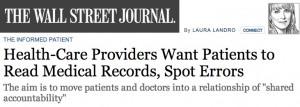 Regular readers know that this blog has long advocated for patient access to, and engagement with, the medical record. In the past 2-3 years we’ve especially advocated for OpenNotes, in which patients can see their primary’s actual visit notes. At my hospital, Beth Israel Deaconess, not only can patients see their primary’s notes, in 2014 it’s extending to all specialties, and in 2015 they plan to make it available even while you’re in the hospital. For those of us who’ve found mistakes in our chart – which is most of us – this is a fabulous aid to patient safety.
Regular readers know that this blog has long advocated for patient access to, and engagement with, the medical record. In the past 2-3 years we’ve especially advocated for OpenNotes, in which patients can see their primary’s actual visit notes. At my hospital, Beth Israel Deaconess, not only can patients see their primary’s notes, in 2014 it’s extending to all specialties, and in 2015 they plan to make it available even while you’re in the hospital. For those of us who’ve found mistakes in our chart – which is most of us – this is a fabulous aid to patient safety.
Well, today’s Wall Street Journal has a fabulous update: as more and more people are trying this, evidence is accumulating that patient access helps improve quality. Examples:
- As many as 95% of medication lists contain errors.(!) (Does yours??)
- Big-name providers are doing it: Cleveland Clinic, Mayo Clinic, the VA health system, Geisinger, Kaiser
- In Geisinger’s year-plus experiment, 80% of patients spotted errors in the medication lists, with an average of 20% of medications being out of date etc.
- (And pharmacists accepted 80% of the proposed changes. In other words, the patients were not irresponsible cuckoo people… as some providers think.)
The combination of the Wall Street Journal name and the big-name clinics should be a potent argument. Patients, don’t be shy about asking your own providers to let you help with data quality. And providers – please – don’t you want some help?
Remember: this is not just about patient rights.
No clinician can perform to the top of their training if the info they’re given is wrong.
In participatory medicine, patients contribute real value to the clinical encounter. This WSJ piece is the latest evidence on how.






Recent Comments